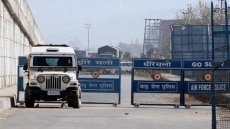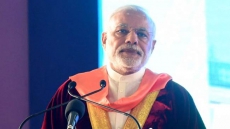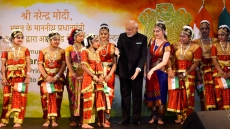Indira Gandhi knew her life was at risk when she decided to go for militarily storm the Golden Temple, President Pranab Mukherjee reveals in the second part of his memoirs released on Thursday.
"The Turbulent Years, 1980-1996" (Rupa) says that "criminals, smugglers and anti-social elements" had joined the Khalistan movement and recalls that the Golden Temple had become a safe haven for them.
The president writes that talks with the Akali Dal failed due to its rigid stance, and last ditch efforts were made shortly before "Operation Blue Star" - as the military operation was codenamed - was launched.
"Even a few days before Operation Blue Star, an attempt was made to find a solution by holding a meeting with the Akali Dal leaders who were brought from jail to the lounge of the Chandigarh airport at midnight.
"P.V. Narasimha Rao, Cabinet Secretary Krishnaswamy Rao Sahib and I represented the government in that meeting. Unfortunately, the talks remained unsuccessful," he says in the book released at the Rashtrapati Bhavan by Vice President M. Hamid Ansari.
"By May 1984, it became increasingly clear that there was no alternative but military action to flush out the terrorists within the Golden Temple, particularly as the negotiations and discussions had not yielded the desired results."

The decision to storm the Golden Temple was taken at a meeting of the Cabinet Committee on Political Affairs (CCPA) but no official was present at the meet, Mukherjee writes.
Operation Blue Star was launched at the Golden Temple on June 3, 1984, with the army entering the premises.
Mukherjee then writes how Gandhi told him she was aware of the threat to her life.
"I still vividly recall Mrs Gandhi telling me, 'Pranab, I know of the consequences.' She understood the situation well and was clear that there was no other option.
"Aware that her own life was at risk, she took a conscious decision to go ahead in the best interest of the nation."
Mukherjee defends the operation, calling the situation in Punjab at that time "abnormal".
"It is easy to say that the military action could have been avoided. However, nobody really knows if any other option would have worked. Such decisions are always taken based on the conditions prevailing at that time. The situation in Punjab was abnormal."
He adds that the "biggest tragedy" of the whole event was the "loss of Mrs Gandhi".

"Her last speech in Orissa, two days before her assassination, was prophetic. She said, 'I am alive today, I may not be there tomorrow... I shall continue to serve until my last breath and when I die, I can say that every drop of my blood will invigorate India and strengthen it'."
Gandhi was assassinated on October 31, 1984, at her Safdarjung Road residence in New Delhi by two of her bodyguards, Satwant Singh and Beant Singh, in the aftermath of Operation Blue Star.
NEVER WANTED TO BE PRIME MINISTER IN 1984: PRANAB MUKHERJEE
President Pranab Mukherjee reveals that he never wanted to be the prime minister after Indira Gandhi's death, as several reports have suggested, as per the second part of his memoirs.
In his book "The Turbulent Years, 1980-1996" (Rupa) released on Thursday, he also writes that he was "shellshocked and flabbergasted" after being dropped from the Rajiv Gandhi cabinet in 1984.
"Finally, many stories have been circulated that I aspired to be the interim Prime Minister, that I had staked claim and had to be persuaded otherwise," Mukherjee writes clearing the air on the issue.
"...And that this created misgivings in Rajiv Gandhi's mind. These stories are completely false and spiteful."

He noted in the book that in the two months leading up to the elections of December 1984, he had Rajiv Gandhi's "full trust".
"My name had been included in his letter to President Zail Singh proposing the list of ministers he had wanted sworn in along with him on 31 October 1984."
"On the morning of 31 December 1984, Rajiv was elected leader of the CPP at 11 a.m. in a meeting held in the Central Hall of Parliament. I chaired the meeting and stood next to him when he announced to the media that the swearing-in would be held at 3 p.m. Even then I was clueless about the manner in which the day would unfold.
"I kept waiting for the call. Being dropped from Rajiv's Cabinet was not even peripherally in my mind. I had heard no rumours, nor had anyone in the party ever vaguely hinted at it. As it happened, P.V. Narasimha Rao, too, was on tenterhooks, calling me several times to check if I had received a call," he writes.
"When I learnt of my ouster from the Cabinet, I was shellshocked and flabbergasted. I could not believe it. But I composed myself, and sat alongside my wife as she watched the swearing-in ceremony on television".

Mukherjee writes as soon as the swearing in ceremony concluded, he wrote to the ministry of urban development asking to be allotted a smaller house in place of his 2 Jantar Mantar residence, a ministerial allocation.
"I then went off on a holiday with my family who had long suffered my neglect."
'BABRI DEMOLITION ONE OF NARASIMHA RAO'S BIGGEST FAILURES'
Inability to prevent the demolition of Babri Mosque was one of the biggest failures of then Prime Minister P.V. Narasimha Rao, President Pranab Mukherjee writes in the second part of his memoirs released on Thursday, also calling it an act that destroyed India's image as a pluralistic nation.
"The inability to prevent the demolition of the Babri Masjid was one of P.V.(Narasimha Rao)'s biggest failures. He should have entrusted the task of tough negotiations with other political parties to a more senior and seasoned politician familiar with politics in UP - like N.D. Tiwari," Mukherjee says in "The Turbulent Years, 1980-1996", released by Vice President M. Hamid Ansari at the Rashtrapati Bhavan.
He also questioned the decision of opening the site for prayers, a decision taken by then prime minister Rajiv Gandhi.
"The opening of the Ram Janmabhoomi temple site on 1 February 1986 was perhaps another error of judgement. People felt these actions could have been avoided."

Mukherjee writes that matters took a "dramatic turn after the fall of the Babri Masjid".
"Sitaram Kesri created a scene, collapsing into tears and disrupting a Cabinet meeting at which I was present. I had to tell him, 'There is no reason to be melodramatic. All of you were members of the Cabinet and some of you were members of the CCPA. All decisions were taken in the meetings of the Cabinet and CCPA. Responsibility is collective; the onus cannot only be on the Prime Minister or Home Minister'."
"Later, in a private meeting with P.V., I did not mince words.
"I burst out, 'Was there no one who advised you of the dangers? Did you not understand the global repercussions of any damage to the Babri Masjid? At least now take concrete steps to quell communal tensions and assuage the feelings of Muslims through affirmative action'," Mukherjee writes.
"P.V. looked at me as I said this, and in his characteristic style did not let any emotion cross his face. But I had known and worked with him for several decades. I did not need to read his face. I could feel his sadness and disappointment. I have often wondered later if it was this outburst of mine which finally led to the call I received from him on 17 January 1993, inviting me to join the Cabinet."
Mukherjee calls the demolition an act of "absolute perfidy, which should make all Indians hang their heads in shame".

"It was the senseless, wanton destruction of a religious structure, purely to serve political ends. It deeply wounded the sentiments of the Muslim community in India and abroad. It destroyed India's image as a tolerant, pluralistic nation..." the president writes.
"In fact, the foreign minister of an important Islamic country later pointed out to me that such damage had not been inflicted on a mosque even in Jerusalem, which has seen religious conflicts for centuries."





